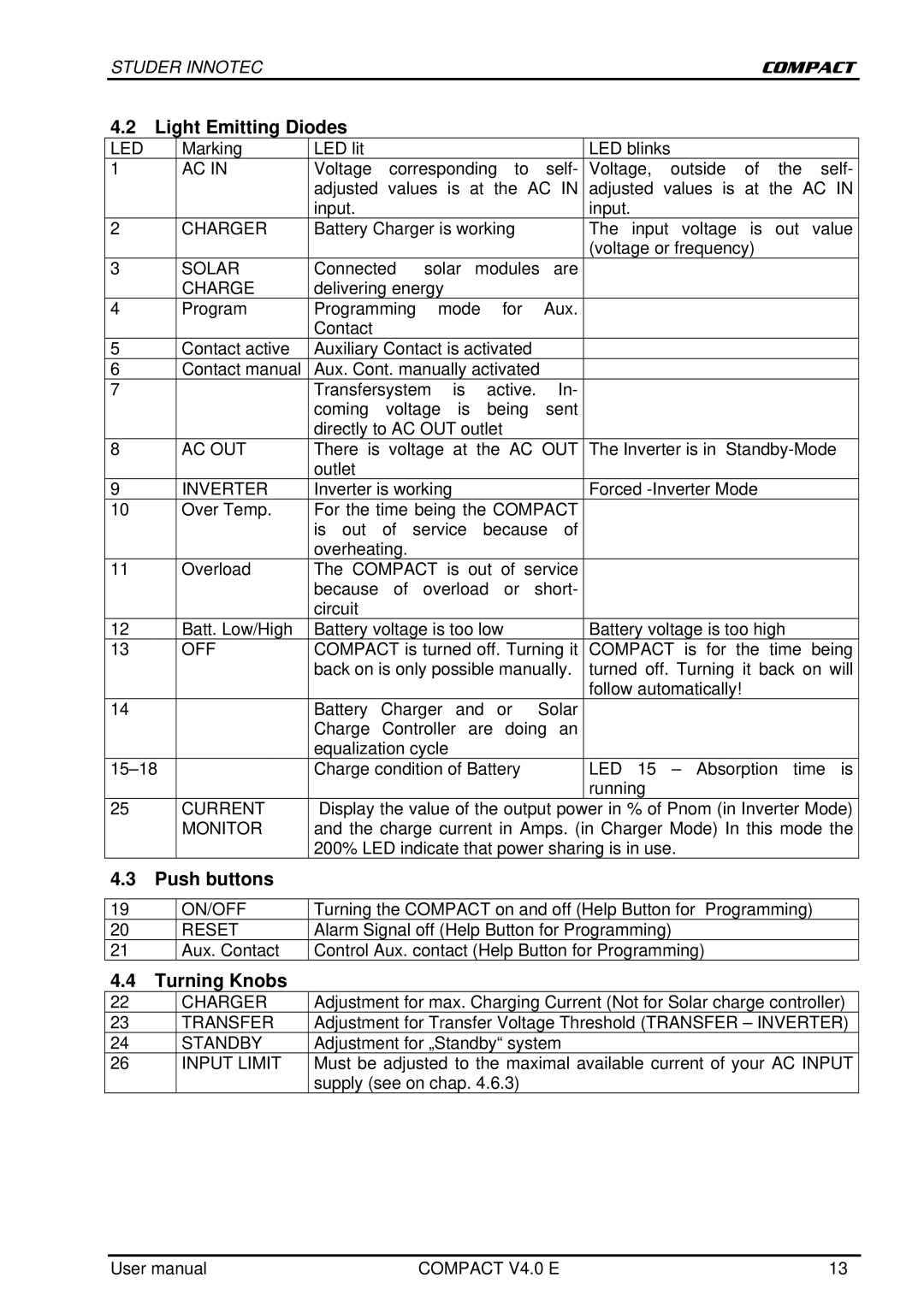
STUDER INNOTEC | COMPACT |
4.2Light Emitting Diodes
LED | Marking | LED lit |
|
|
| LED blinks |
1 | AC IN | Voltage corresponding to self- | Voltage, outside of the self- | |||
|
| adjusted values is at the AC IN | adjusted values is at the AC IN | |||
|
| input. |
|
|
| input. |
2 | CHARGER | Battery Charger is working |
| The input voltage is out value | ||
|
|
|
|
|
| (voltage or frequency) |
3 | SOLAR | Connected | solar modules | are |
| |
| CHARGE | delivering energy |
|
|
| |
4 | Program | Programming | mode | for | Aux. |
|
|
| Contact |
|
|
|
|
5 | Contact active | Auxiliary Contact is activated |
|
| ||
6 | Contact manual | Aux. Cont. manually activated |
|
| ||
7 |
| Transfersystem is active. In- |
| |||
|
| coming voltage is being sent |
| |||
|
| directly to AC OUT outlet |
| The Inverter is in | ||
8 | AC OUT | There is voltage at the AC OUT | ||||
|
| outlet |
|
|
| Forced |
9 | INVERTER | Inverter is working |
|
| ||
10 | Over Temp. | For the time being the COMPACT |
| |||
|
| is out of service because of |
| |||
|
| overheating. |
|
|
|
|
11 | Overload | The COMPACT is out of service |
| |||
|
| because of overload or short- |
| |||
|
| circuit |
|
|
| Battery voltage is too high |
12 | Batt. Low/High | Battery voltage is too low |
| |||
13 | OFF | COMPACT is turned off. Turning it | COMPACT is for the time being | |||
|
| back on is only possible manually. | turned off. Turning it back on will | |||
|
|
|
|
|
| follow automatically! |
14 |
| Battery Charger and | or Solar |
| ||
|
| Charge Controller are doing an |
| |||
|
| equalization cycle |
|
| LED 15 – Absorption time is | |
| Charge condition of Battery |
| ||||
|
|
|
|
|
| running |
25 | CURRENT | Display the value of the output power in % of Pnom (in Inverter Mode) | ||||
| MONITOR | and the charge current in Amps. (in Charger Mode) In this mode the | ||||
|
| 200% LED indicate that power sharing is in use. | ||||
4.3Push buttons
19ON/OFF
20RESET
21Aux. Contact
4.4Turning Knobs
22CHARGER
23TRANSFER
24STANDBY
26INPUT LIMIT
Turning the COMPACT on and off (Help Button for Programming) Alarm Signal off (Help Button for Programming)
Control Aux. contact (Help Button for Programming)
Adjustment for max. Charging Current (Not for Solar charge controller) Adjustment for Transfer Voltage Threshold (TRANSFER – INVERTER) Adjustment for „Standby“ system
Must be adjusted to the maximal available current of your AC INPUT supply (see on chap. 4.6.3)
User manual | COMPACT V4.0 E | 13 |
